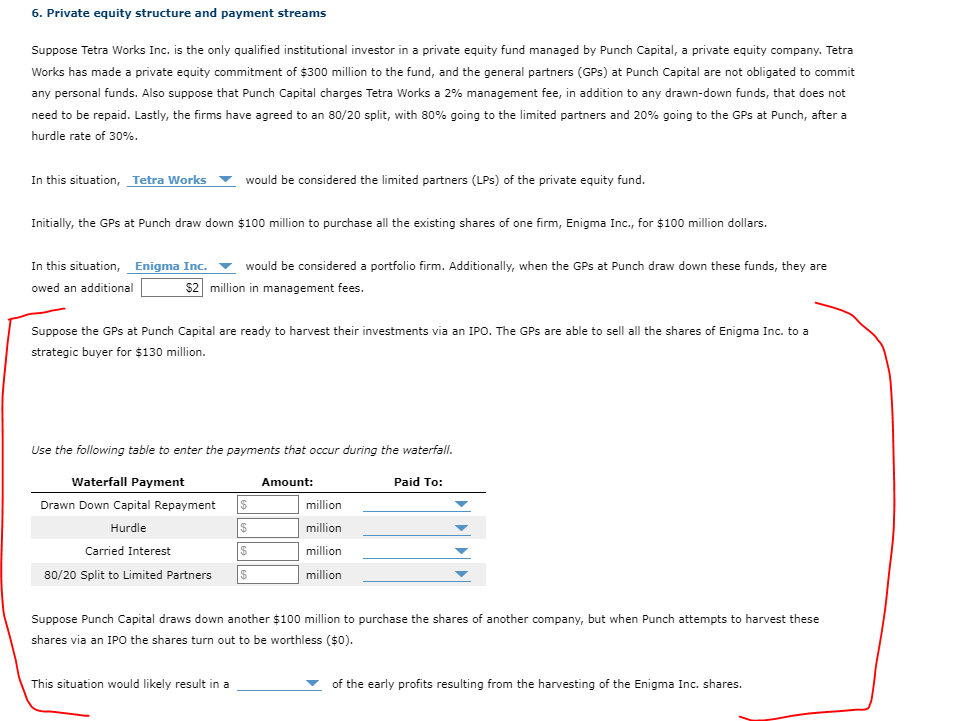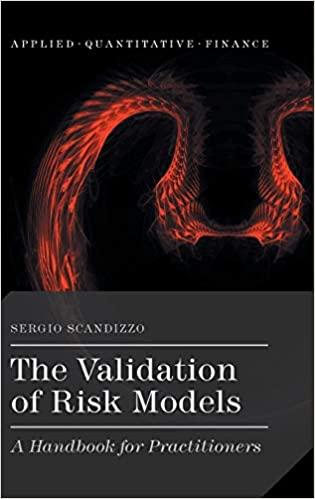Answered step by step
Verified Expert Solution
Question
1 Approved Answer
only marked in red please. blanks could be: enigma inc, tetra works, OR punch capital last blank: give bac, claw-back OR TAKE-BACK Suppose Tetra Works

only marked in red please.
blanks could be: enigma inc, tetra works, OR punch capital
last blank: give bac, claw-back OR TAKE-BACK
Suppose Tetra Works Inc. is the only qualified institutional investor in a private equity fund managed by Punch Capital, a private Works has made a private equity commitment of $300 million to the fund, and the general partners (GPs) at Punch Capital are not obligated to commention any personal funds. Also suppose that Punch Capital charges Tetra Works a 2% management fee, in addition to any drawn-down funds, that does not need to be repaid. Lastly, the firms have agreed to an 80/20 split, with 80% going to the limited partners and 20% going to the GPs at Punch, after a hurdle rate of 30%. In this situation, would be considered the limited partners (LPs) of the private equity fund. Initially, the GPs at Punch draw down $100 million to purchase all the existing shares of one firm, Enigma Inc., for $100 million dollars. In this situation, would be considered a portfolio firm. Additionally, when the GPs at Punch draw down these funds, they are owed an additional million in management fees. Suppose the GPs at Punch Capital are ready to harvest their investments via an IPO. The GPs are able to sell all the shares of Enigma Inc. to a strategic buyer for $130 million. Use the following table to enter the payments that occur during the waterfall. Suppose Punch Capital draws down another $100 million to purchase the shares of another company, but when Punch attempts to harvest these shares via an IPO the shares turn out to be worthless ($0). This situation would likely result in a of the early profits resulting from the harvesting of the Enigma Inc. shares. Suppose Tetra Works Inc. is the only qualified institutional investor in a private equity fund managed by Punch Capital, a private Works has made a private equity commitment of $300 million to the fund, and the general partners (GPs) at Punch Capital are not obligated to commention any personal funds. Also suppose that Punch Capital charges Tetra Works a 2% management fee, in addition to any drawn-down funds, that does not need to be repaid. Lastly, the firms have agreed to an 80/20 split, with 80% going to the limited partners and 20% going to the GPs at Punch, after a hurdle rate of 30%. In this situation, would be considered the limited partners (LPs) of the private equity fund. Initially, the GPs at Punch draw down $100 million to purchase all the existing shares of one firm, Enigma Inc., for $100 million dollars. In this situation, would be considered a portfolio firm. Additionally, when the GPs at Punch draw down these funds, they are owed an additional million in management fees. Suppose the GPs at Punch Capital are ready to harvest their investments via an IPO. The GPs are able to sell all the shares of Enigma Inc. to a strategic buyer for $130 million. Use the following table to enter the payments that occur during the waterfall. Suppose Punch Capital draws down another $100 million to purchase the shares of another company, but when Punch attempts to harvest these shares via an IPO the shares turn out to be worthless ($0). This situation would likely result in a of the early profits resulting from the harvesting of the Enigma Inc. sharesStep by Step Solution
There are 3 Steps involved in it
Step: 1

Get Instant Access to Expert-Tailored Solutions
See step-by-step solutions with expert insights and AI powered tools for academic success
Step: 2

Step: 3

Ace Your Homework with AI
Get the answers you need in no time with our AI-driven, step-by-step assistance
Get Started


